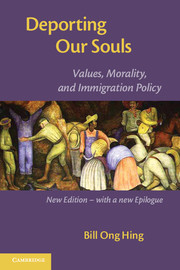Book contents
- Frontmatter
- Contents
- Foreword by Senator Edward M. Kennedy
- Acknowledgments
- DEPORTING OUR SOULS
- Introduction: Hysteria and Shame
- 1 Illegal Immigration: Give Them a Parade
- 2 Deporting Our Souls
- 3 Promoting Family Values and Immigration
- 4 Misusing Immigration Policies in the Name of Homeland Security
- 5 A Welcome Wagon for New Americans
- Epilogue: A Policy of Humanity
- Index
5 - A Welcome Wagon for New Americans
Published online by Cambridge University Press: 18 August 2009
- Frontmatter
- Contents
- Foreword by Senator Edward M. Kennedy
- Acknowledgments
- DEPORTING OUR SOULS
- Introduction: Hysteria and Shame
- 1 Illegal Immigration: Give Them a Parade
- 2 Deporting Our Souls
- 3 Promoting Family Values and Immigration
- 4 Misusing Immigration Policies in the Name of Homeland Security
- 5 A Welcome Wagon for New Americans
- Epilogue: A Policy of Humanity
- Index
Summary
Reports that the July 7, 2005, London subway suicide bombings were perpetrated by “home-grown” Muslim terrorists, “born and brought up in respectable suburbs of northern England, rather than medieval religious fanatics,” came as a surprise to many observers. Three were born in Great Britain, went to British schools, raised children there, worked in local shops, and were part of a community. Sometime, somehow they were inculcated with a message of hate, revenge, and contempt. In recalling Timothy McVeigh, no one doubted that the United States has its own brand of home-grown terrorists. But when it came to Muslims in our communities, the United States received stellar marks for being welcoming to people of different backgrounds. British Parliament member Boris Johnson praised the United States for giving its immigrants “an equal stake in society.” Fareed Zakaria of Newsweek gave similar credit to the United States:
In a sense it was always too simple to say that we would spread democracy in the Arab world and that will change things. It's true that there's a lot of dysfunctions built up in the Arab world and spreading democracy or helping them become more democratic and open up their systems will help. [But] this is a virus that developed over 30 or 40 years, and it spread [as a] part of globalization. Radical Islam spread from Saudi Arabia and got globalized. And there are people, disaffected young men in Europe, particularly in Europe because they tend to not get assimilated very well, who search around for some grand theory, kind of ideology, of protest.[…]
- Type
- Chapter
- Information
- Deporting our SoulsValues, Morality, and Immigration Policy, pp. 164 - 203Publisher: Cambridge University PressPrint publication year: 2006

